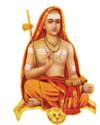In all Bhakti there is an element of Jnana.

QUESTION: The expression Jnanamisra-bhakti (Bhakti mixed with Jnana) is frequently used in Ramakrishna-Vivekananda literature. Kindly explain its real meaning and how it should be practised. How is it different from ordinary Bhakti?
MAHARAJ: To make the matter clear, the expression ‘ordinary Bhakti’ must be explained. Ordinary Bhakti can be understood to mean ‘conventional devotion,’ i.e., acceptance of certain creeds and practices and of certain devotional observances that have come to one through family tradition. But it becomes genuine Bhakti only when it is made dynamic by Sraddha, the deep-seated acceptance of spiritual values as a dominant factor in life.
For man to love anything, there must be some preceding knowledge of it. But the demand for knowledge ceases when a strong link of affection is established. This affection may be based on the gains you are likely to have by serving the person faithfully and winning his favour; or it may be based on the feeling that the person is one’s ‘own’, irrespective of what one gets from him or not. When anything is one’s ‘own’, it becomes sweet, irrespective of gains.
This story is from the August 2019 edition of The Vedanta Kesari.
Start your 7-day Magzter GOLD free trial to access thousands of curated premium stories, and 9,000+ magazines and newspapers.
Already a subscriber ? Sign In
This story is from the August 2019 edition of The Vedanta Kesari.
Start your 7-day Magzter GOLD free trial to access thousands of curated premium stories, and 9,000+ magazines and newspapers.
Already a subscriber? Sign In

Panchakroshi Parikrama of Varanasi
At the snow-capped Kailas, the Divine Lord Shiva was seated with Mother Parvati.

Gadai and the Monks
A fictional narrative based on incidents from the childhood of Sri Ramakrishna.

Chintayo momo maanosho Hori...
Sri Ramakrishna loved songs. There probably was no normal day when he did not sing some songs.

The Vedanta Vaccine
The world is still struggling under the impact of the pandemic due to Covid-19 for the last three years.

Chandrakirti's Chariot: Self in Madhyamaka Buddhism and Advaita Vedanta
The goal in Advaita Vedanta is the cessation of suffering and the attainment of true fulfillment. Suffering, according to this school, is due to ignorance of the true nature of the self and consequent erroneous identification with the body-mind.

Reminiscences of Sargachhi
Question: यद्यदाचरतत श्रेष्ठसतत्तदरेवरेतरो जनिः। ‘Whatever a superior person does, others do the same thing!’ (Gita 3:21) – What does this statement mean?

THE AUTUMN FESTIVAL
A fictional narrative based on incidents from the childhood of Sri Ramakrishna.

Bards of Guruvayur: Vilwamangalam II
Saints of India

In the Universal Mother’s Divine Playground
Swami Vivekananda never taught the worship of Mother Kali. In a letter to Mary Hale he writes, “Kali worship is not a necessary step in any religion.

Swami Vivekananda: A Sportsman Par Excellence
In various books and articles, Swami Vivekananda has been called a spiritual leader, a prophet, a patriot, a social reformer, a philosopher, a yogi, a writer, an orator, an educationist, a musician, and so on.